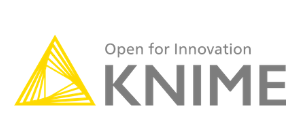
No-Code
Data Science
Don't Know Coding? No problem!
In this live training you will explore how to get into Data Science with a non-technical background. You would be practicing on visual programming & drag-and-drop tools like KNIME to build Data Science & ML Models such as KNIME. This complete training will help you master all three elements of Data Science – Statistics, Tools, and Business Knowledge.
We’ll be covering the complete process of Data Science from Data Integration, Data Manipulation, Descriptive Analytics and Visualization to Statistical Analysis, using drag & drop tools and Machine Learning models, using Predictive Modeling, Regression Algorithms & Linear Regression.
By the end of this training, you will have enough knowledge and hands-on expertise in different tools of Data Science to use and apply them in the real world around you.
Training Outcomes
[wp-svg-icons icon=”checkmark” wrap=”i”] Assignments & Quizzes
[wp-svg-icons icon=”checkmark” wrap=”i”] Industry oriented project
[wp-svg-icons icon=”checkmark” wrap=”i”] Get access to recorded lectures
[wp-svg-icons icon=”checkmark” wrap=”i”] 75% Hands-on!
[wp-svg-icons icon=”checkmark” wrap=”i”] Dice shareable certificate
View Course Outline
Book a Seat

Schedule
Starting Date
31 December, 2022
Duration
8 weeks
Class Timings
Sat & Sun (11 AM – 4PM)
Language
Urdu/Hindi
Meet the Instructor!
Meet the trainers of this course who are highly experienced Data Science experts!
Tools
The following tool will be covered during the training through hands-on exercises
Course Outline
Week 1: Introduction
- What is Data Science
- Introduction to Big Data, Data Science, and Predictive Analytics
- Fundamentals of Data Mining
- Python/R a Myth
- Data Based Decision Making and Industrial Practices
- Difference Between Conventional Marketing and Data Science
- Career Growth Tracks
- Data Visualization Tools Overview
- Marketing Intelligence Tools and AI
- Drag & Drop Tools of Data Science
- SAP Predictive Analytics Basic Understanding
- What is CRISP-DM Methodology?
- KNIME Installation
- KNIME Hands One & Tool Understanding
- KNIME Interface Walkthrough
- What are Node and Workflows?
Week 2: Exploring KNIME
- Import/ Export from Files to Databases
- What are KNIME Extensions?
- Exploring the KNIME Hub
- Data Exploration & Understanding
- Understanding Workspace
- Creation of Personalized Workspace
- Feature Engineering for Variables
- Cleaning Data with Missing Value Node
- Performing Univaraite Analysis & Bivariate Analysis
- Different Methods for Data Sampling
- Types of Data Sampling
- Organizing Workflows through Comments & Annotations
- Data Visualization (Box Plot, Graphs, etc)
- Normal Distribution
- Basics of Connecting Table (Joins)
- Study Design and Scope of Data Science
- Introduction to Kaggle and Anaconda
Week 3: Data Segmentation
- Introduction to Supervised Learning
- Approaches for Blending and Merging of Data
- Filtering your data on basis of your row and column values
- Modularization of Nodes into Meta Nodes
- Understanding Joiners and Rule Engine Nodes
- Understanding Data Aggregations
- How does Feature Engineering Works?
- Creating Multiple (~100) Variables from POS data using KNIME
- Understanding Pre & Post Analysis for Value Upgradation
- RFM Segmentation for Customer Segmentation & Loyalty
- RFM Segmentation and its role in feature engineering
- Insights Creation from a data set
- Project #1: Wrapping up RFM Segmentation
Week 4: Clustering using Machine Learning
- What is Machine Learning?
- Understanding Unsupervised Learning
- Limitations and Requirements of Unsupervised Learning
- Understand Exploratory Data Analysis
- Find hidden patterns using ML
- Unsupervised Learning
- Basics of Clustering
- Understanding KMeans
- Identify optimal number of K by Elbow Analysis
- Introduction to Radar chart, pie chart, etc
- Anomaly Detection in data and its removal
- Feature Scaling and why does it matter?
- Cluster Validation by Silhouette Coefficient
- Multiple iterations for detecting optimal K
- Benefits of Unsupervised learning
- Project #2: Clusters Profiling
Week 5: Predictive Modeling
- Supervised Learning Basics
- Regression Algorithms
- Logistic Regression Algorithm
- Correlation Matrix Understanding
- Understanding Performance Metrics
- Confusion Matrix
- Use Case: Fraud Evaluation
- Understanding Precision, Accuracy, Recall, F Measure
- Receiver Operating Characteristics
- ROC Curve, AUC, TPR, FPR
- KNN Model Complexity
- Hands-On Lab: Building a Classifier
- Churn Prediction Model to maintain service experience
- Hands-On Activity: Determining the best split for Classification Models, Evaluation and Cross Validation
- Industrial Practices and Guest Lecture
Week 6: Regression
- Understand Value Functions
- Revise straight line equations
- Linear Regression
- R-Squared and Adjusted R-Squared
- Residual Plots and their Intuition
- Multivariate Regression
- Outliers Detection in Regression Data
- Over-fitting & Under-fitting
- Understand how to use best fit for decision making
- Bias-Variance Trade-off
- Types of Bias and Errors
- Regularization
- Set Parameters within a dataset
- Industrial Practices for using regression model
- Hands-On Lab: Building a Regression Model
- Hands-On Activity: Evaluating Performance, Finding Maxima and Minima, Gradient Descent, Visualizing Features and Parameter
Week 7: Decision Making Tools
- Decision Trees
- Creation of Decision Tree in KNIME
- Make class labels for features in Decision Trees
- Evaluation optimal choice using Decision Trees
- Importance of Gini Index for a model
- Random Forest
- Construction of multitude of decision trees
- Association Rules
- Application of Association Rule
- Target variable based on several input variables
- Support & Lift
- Bagging, Boosting and Ensemble Methods
- Recommendation Engine Understanding
- Used Cases and Project Discussion
Week 8: Use Cases Discussion
- Overview of Different Projects
- Anomaly Detection
- Churn Prediction
- Credit Risk Modelling
- Market Basket Analysis
- Fraud Detection
- Outlier Detection in Medical Claims
- Social Media Clustering
- Discussion on Final Project
- Use of ML and AI in daily life
- How to apply your learnings in real life situations
- Application and usage of KNIME at your workplace
- Answering business questions
- Solve business problems using data
Pricing Details
Online Banking details will be shared by our representatives after you reserve your seat
- Individual Pricing
-
-
PKR 30,000 Per Person
- Total Charges for the Training
-
- Group of 2
-
-
PKR 27,900 Per Person
- 7% Off for Group of 2
-
- Group of 3
-
-
PKR 27,000 Per Person
- 10% Off for Group of 3
-
- Group of 4 or more
-
-
PKR 25,500 Per Person
- 15% Off for Group of 4 or more
-
Reserve your Seat
You can reserve your seat by filling the form below



